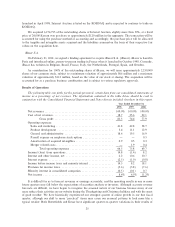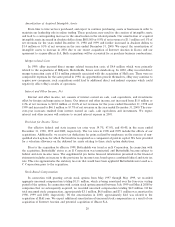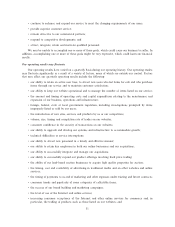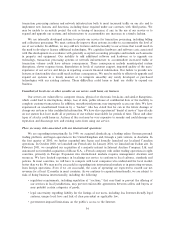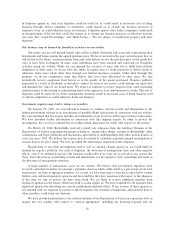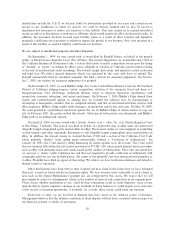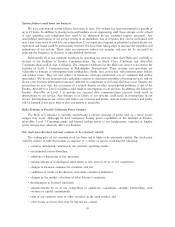eBay 2000 Annual Report Download - page 35
Download and view the complete annual report
Please find page 35 of the 2000 eBay annual report below. You can navigate through the pages in the report by either clicking on the pages listed below, or by using the keyword search tool below to find specific information within the annual report.change in accounting method is a gain of approximately $650,000 and a loss of approximately $2.6 million,
respectively, net of tax.
In July 2000, the Emerging Issues Task Force (""EITF'') reached a consensus with respect to EITF Issue
No. 99-19, ""Reporting Revenue Gross as a Principal versus Net as an Agent.'' EITF 99-19 addressed whether
a company should report revenue based on the gross amount billed to a customer because it has earned
revenue from the sale of the goods or services or the net amount retained (that is, the amount billed to the
customer less the amount paid to a supplier) because it has earned a commission or fee. We adopted EITF 99-
19, and such adoption did not have a material impact on its consolidated Ñnancial statements.
In March 2000, the EITF reached a consensus on EITF Issue No. 00-14, ""Accounting for Certain Sales
Incentives.'' This consensus provides guidance on the recognition, measurement, and income statement
classiÑcation of sales incentives which are oÅered voluntarily by a vendor without charge to customers that can
be used in, or that are exercisable by a customer as a result of, a single exchange transaction. We evaluated the
provisions of the guidance in conjunction with our policies and concluded that we are in compliance with this
pronouncement.
In July 2000, the EITF issued EITF Issue No. 00-15, ""ClassiÑcation in the Statement of Cash Flows of
the Income Tax BeneÑt Realized by a Company upon Employee Exercise of a Non-qualiÑed Stock Option.''
EITF 00-15 addresses the cash Öow statement presentation of the tax beneÑt associated with the exercise of
nonqualiÑed stock options. We receive an income tax deduction for the diÅerence between the exercise price
and the market price of a nonqualiÑed stock option upon exercise by the employee. EITF 00-15 concludes that
the income tax beneÑt realized by us upon employee exercise should be classiÑed in the operating section of
the cash Öow statement. The EITF is eÅective for all quarters ending after July 20, 2000. We adopted
EITF 00-15, and such adoption did not have a material impact on our consolidated Ñnancial statements.
In July 2000, the EITF issued EITF Issue No. 00-16, ""Recognition and Measurement of Employer
Payroll Taxes on Employee Stock-Based Compensation.'' This Issue addresses how an entity should account
for employer payroll taxes on stock-based compensation under Accounting Principles Board Opinion No. 25,
""Accounting for Stock Issued to Employees,'' and SFAS No. 123, ""Accounting for Stock-Based Compensa-
tion.'' This Issue addresses our timing for recognizing our payroll tax liability and requires that this liability be
recognized when the tax obligation is due and payable. We adopted EITF 00-16 eÅective July 31, 2000. Such
adoption did not have a material impact on our consolidated Ñnancial statements.
Risk Factors that may AÅect Results of Operations and Financial Condition
The risks and uncertainties described below are not the only ones facing eBay. Additional risks and
uncertainties not presently known to us or that we currently deem immaterial also may impair our business
operations. If any of the following risks or such other risks actually occur, our business could be harmed.
We have a limited operating history
Our company was formed as a sole proprietorship in September 1995 and was incorporated in May 1996.
We have only a limited operating history on which you can base an evaluation of our business and prospects.
As an online commerce company still relatively early in our development, we face substantial risks,
uncertainties, expenses and diÇculties. To address these risks and uncertainties, we and our subsidiaries must
do the following:
‚ maintain and increase our number of registered users, items listed on our service and completed sales;
‚ expand into new areas;
‚ maintain and grow our website and customer support operations at a reasonable cost;
‚ continue to make trading through our service safer for users;
‚ maintain and enhance our brand;
‚ continue to develop and upgrade our technology and information processing systems;
30







